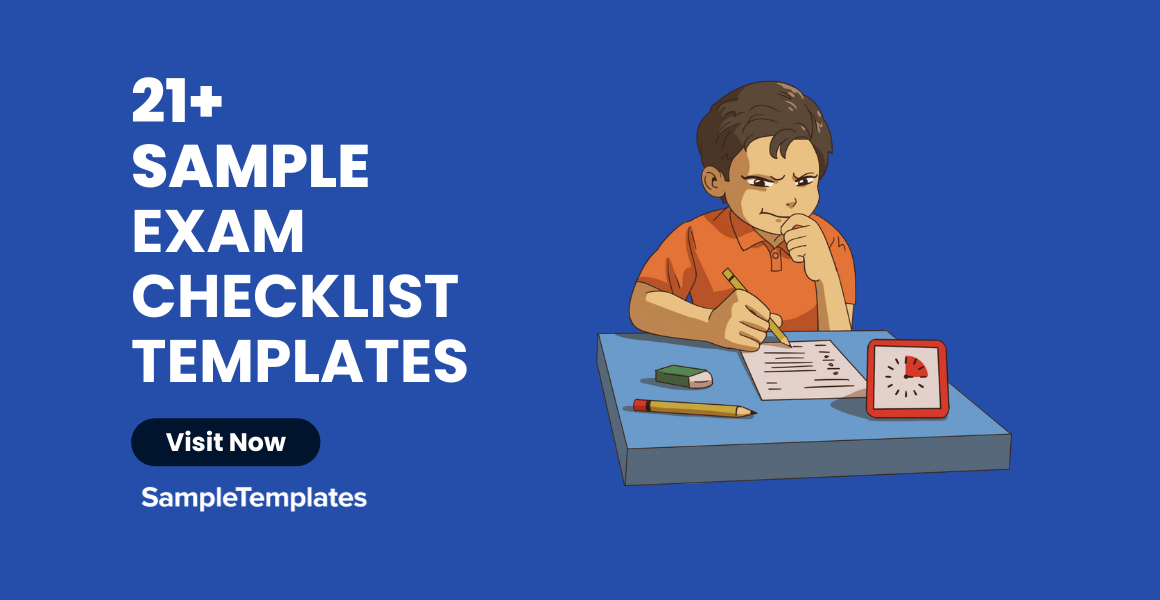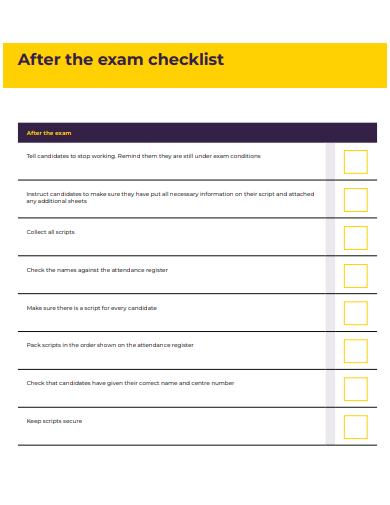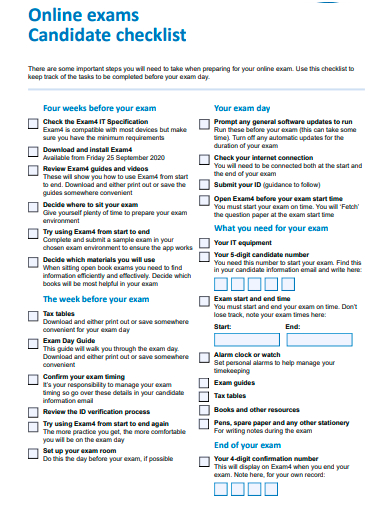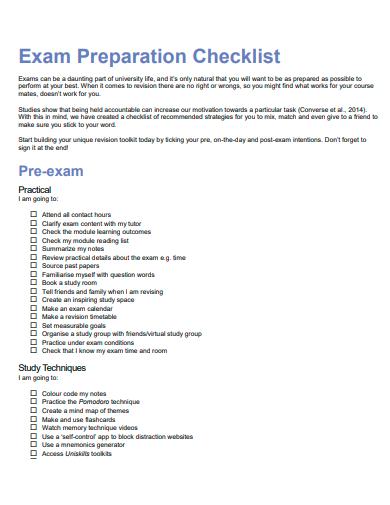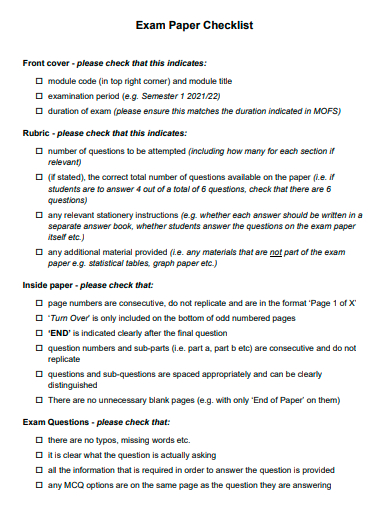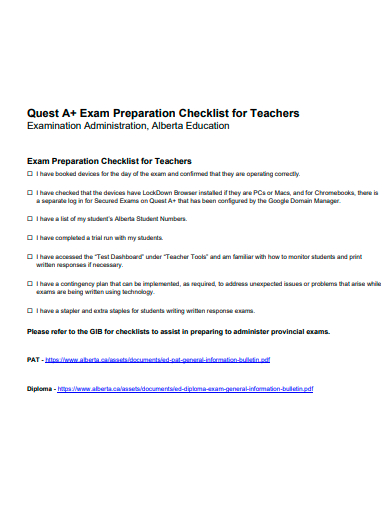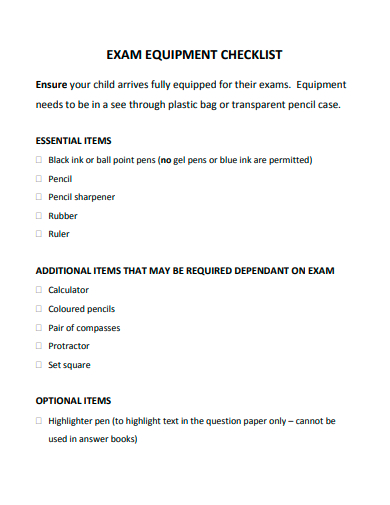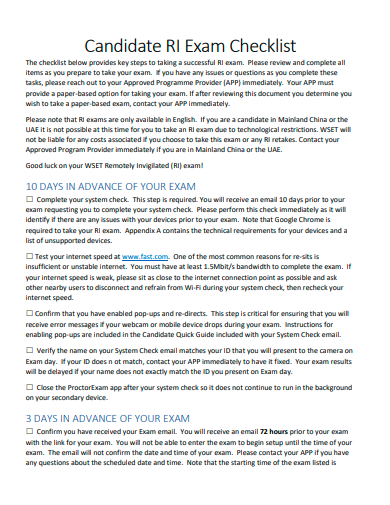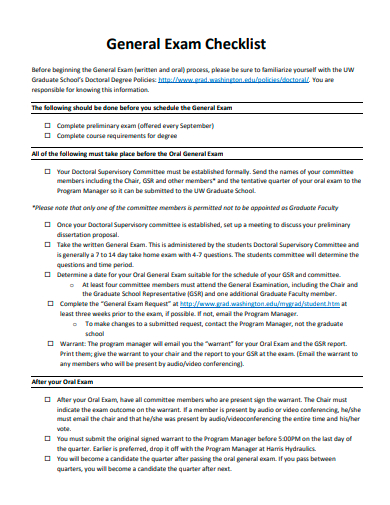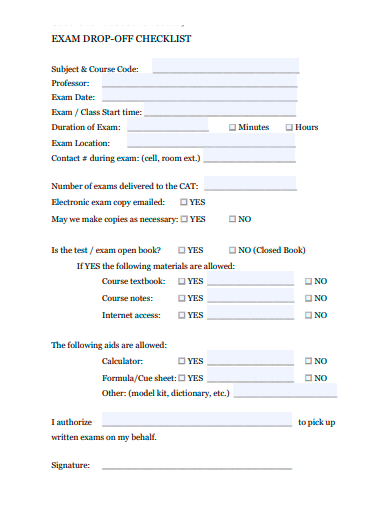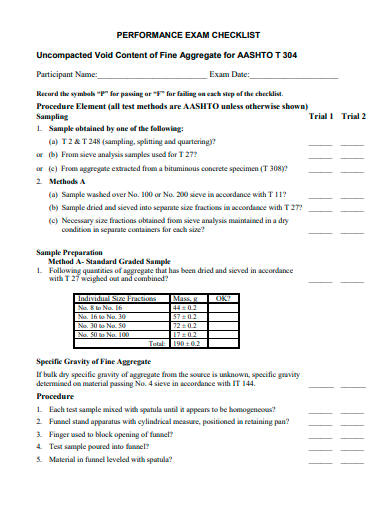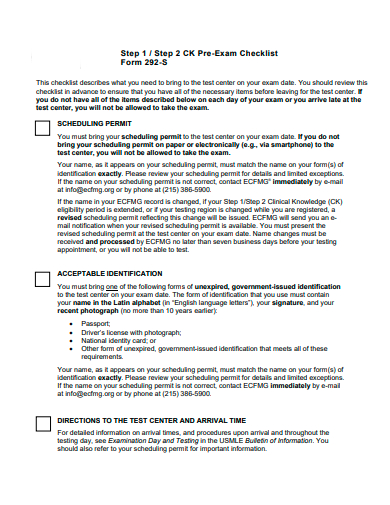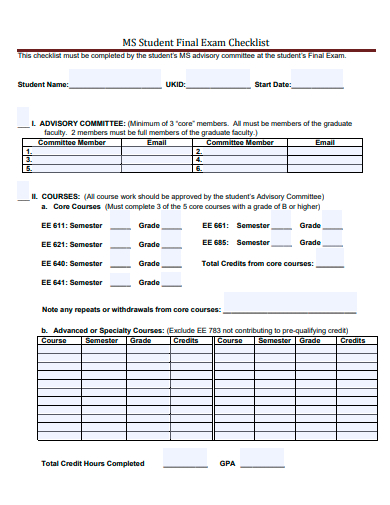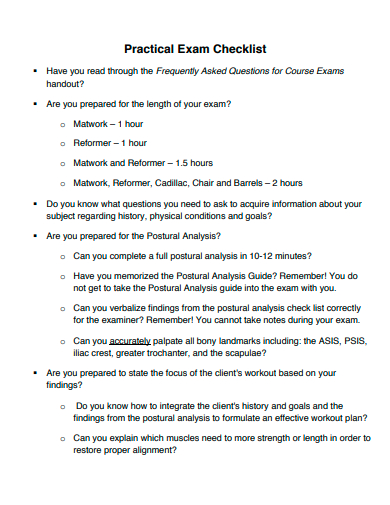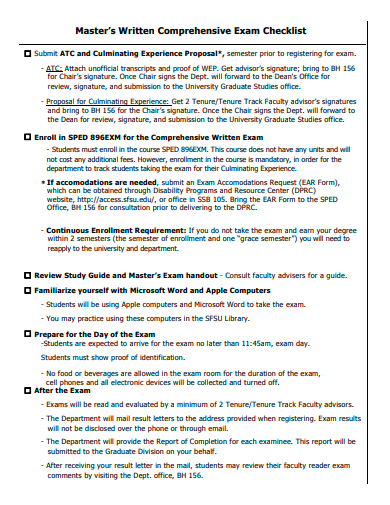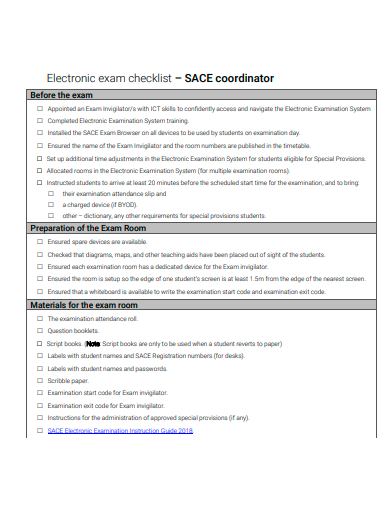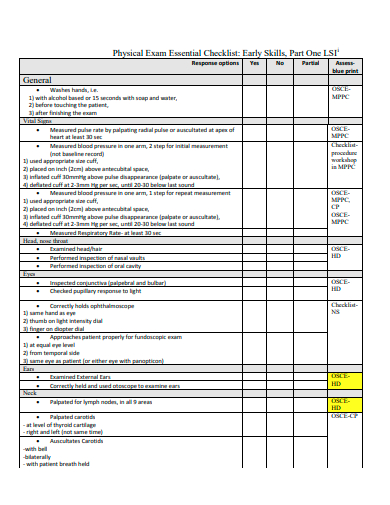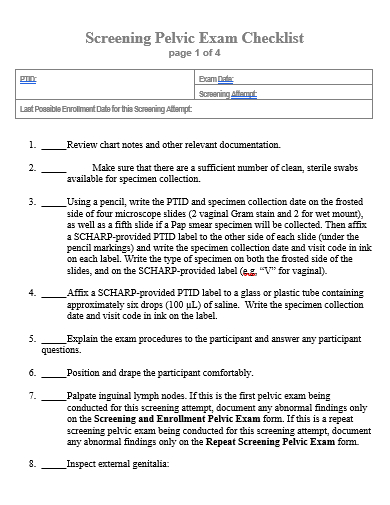Preparing for exams can often feel overwhelming, but with the right approach, success is within reach. Our comprehensive Exam Checklist ensures students cover all bases, from study strategies to essential materials. Tailored to meet modern educational standards, this guide aims to alleviate test-related stress and optimize study sessions. Dive in to discover the key steps to acing your exams and making the most of your preparation time.
21+ Exam Checklist Samples
1. Education Physical Exam Checklist
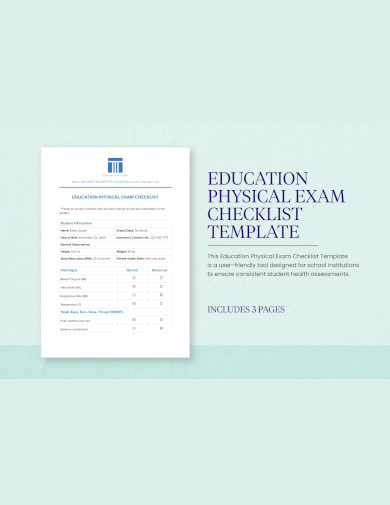
2. Sample Checklist Template
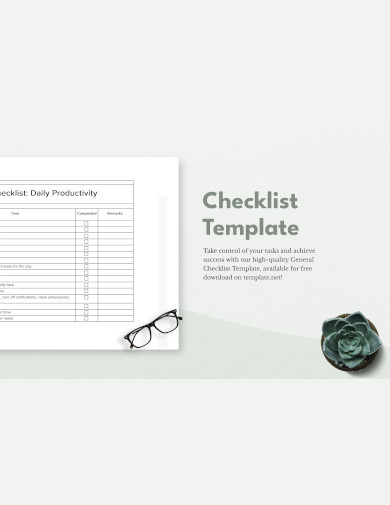
3. Basic Checklist Template
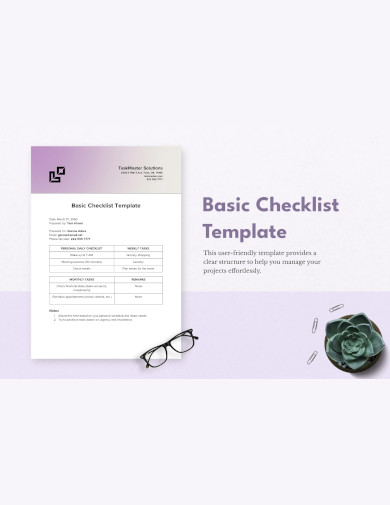
4. Formal Checklist Template
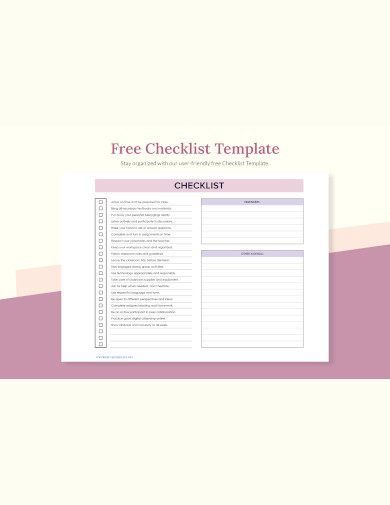
5. Printable Checklist Template
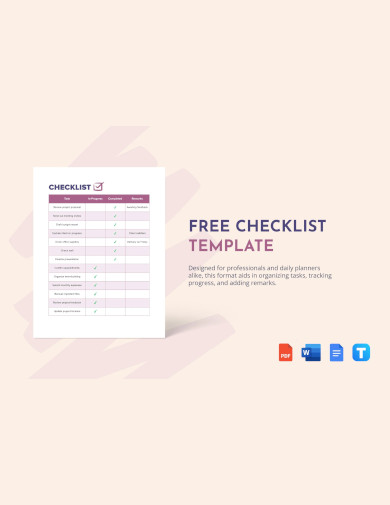
What is an Exam Checklist?
Preparing for an exam can be daunting. No matter how well you’ve studied, there are always those last-minute doubts and fears about whether you’ve covered everything. An exam printable checklist can be a saving grace in these moments, ensuring you’re well-prepared not just in terms of content, but also in terms of the logistics and mental preparedness for the day. Here’s a detailed breakdown of what an exam checklist is and why it can be invaluable.
Understanding the Concept
An exam checklist is essentially a sample list of tasks, materials, and considerations you should review or take into account before you walk into the exam hall. Think of it as a to-do list or a final revision sheet, but one that goes beyond just the topics or subjects you’ve studied. It takes into account the holistic preparation required for an exam.
Content Review
This is the most straightforward part of the checklist. Here, you’d list down the topics, subtopics, or modules you need to review. For instance, if you’re preparing for a history exam, your list might include specific eras, events, or figures. Ticking off items from this list can give you a clear idea of your progress and what areas might need more attention.
Logistical Preparation
Beyond the content, there are the logistics. This includes ensuring you have all necessary materials like pens, pencils, ID cards, admit cards, calculators (if allowed), and any other specific materials the examination body has mentioned. It’s easy to overlook these details amidst rigorous studying, but forgetting an ID card or admit card can be disastrous on the day of the exam.
Mental and Physical Preparedness
Exams are as much a test of endurance and mental fortitude as they are of knowledge. Your checklist should include items that cater to your mental and physical well-being. This can range from ensuring you get enough sleep before the exam day, to doing a bit of light exercise or meditation for relaxation, to even setting aside time for breaks while studying.
Last-minute Tips
Often, teachers or fellow students share last-minute tips or tricks that can be handy. Your checklist should have a space to jot these down so that they’re not forgotten. This could be a mnemonic to remember a formula, a hint about the exam format, or a quick revision sample strategy that someone found effective.
Mock Tests and Practice
Before the actual exam, it’s always beneficial to take a few mock tests. These should ideally mimic the conditions of the real exam. Your checklist can include the number of mock tests you aim to complete and track your progress as you go along.
Importance of Exam Checklist:
An exam checklist is more than just a list of items to remember; it is a tool that can significantly enhance your preparedness and confidence levels when taking an exam. This guide delves into the reasons that underscore the importance of having an exam checklist.
1. Organized Preparation
In the realm of examinations, being systematic is half the battle won. An exam checklist provides a structured approach to your revision and preparation. With a clear list of topics, chapters, and concepts to review, you can ensure that no important topic is overlooked.
2. Reduces Anxiety
The sheer volume of material to study can be overwhelming, leading to anxiety. A checklist breaks down this bulk into manageable chunks. Every time you tick off an item, there’s a sense of accomplishment, gradually alleviating the anxiety related to pending topics.
3. Logistical Assurance
Beyond academic preparation, there’s a logistical aspect to exams – carrying the right stationery, sample ID cards, hall tickets, or any other essentials specified by the examination body. Forgetting any of these can be a major setback on the exam day. An exam checklist ensures you have everything you need, preventing such avoidable mishaps.
4. Time Management
An exam checklist can be used to allocate time for each topic or subject. This can be particularly helpful in the last few days leading up to the exam when you’re trying to optimize your revision. By allocating specific time slots for each topic, you ensure a balanced revision, avoiding the pitfall of spending too much time on one topic at the expense of others.
5. Boosts Confidence
There’s a psychological aspect to ticking off items from a list. Each tick serves as a mini-validation of your efforts, progressively building your confidence. By the time you’ve ticked off most items, you’re not just academically prepared but also mentally primed for the exam.
6. Incorporation of Feedback
If you’re practicing with mock tests or sample papers, you’ll likely receive feedback on areas of improvement. An exam checklist can be updated to incorporate this sample feedback, ensuring that you address those areas before the actual exam.
7. Holistic Preparation
Exams are not just about rote learning. They test understanding, application, and sometimes even creativity. A well-constructed checklist ensures you’re preparing holistically, covering theoretical knowledge, application-based questions, and even potential out-of-the-box questions.
8. Fosters Responsibility
Creating and adhering to an exam checklist fosters a sense of responsibility. It puts the onus on the student to be proactive, ensuring they’re not reliant on last-minute crams or hoping for luck on exam day.
6. After Exam Checklist Template
7. Online Exam Candidate Checklist Template
8. Exam Preparation Checklist Template
9. Exam Paper Checklist Template
10. Exam Preparation Checklist for Teachers Template
11. Exam Equipment Checklist Template
12. Candidate Exam Checklist Template
13. General Exam Checklist Template
14. Exam Drop-Off Checklist Template
15. Performance Exam Checklist Template
16. Pre-Exam Checklist Template
17. Student Final Exam Checklist Template
18. Practical Exam Checklist Template
19. Comprehensive Exam Checklist Template
20. Electronic Exam Checklist Template
21. Physical Exam Essential Checklist Template
22. Screening Exam Checklist Template
How do I Make an Exam Checklist?
Creating an effective exam checklist requires thought, foresight, and a bit of organization. Here’s a simple step-by-step guide to help you construct one:
1. Gather All Study Materials
Before you can list out what you need to cover, ensure you have all your study materials on hand. This includes textbooks, sample notes, study guides, past papers, and any online resources. Having everything within reach will ensure you don’t miss out on any topic.
2. Break Down the Syllabus
Start with the official sample syllabus or curriculum guide. This document often lists all the topics that are expected for the exam. Break down each subject or module into its constituent topics and subtopics. This will be the backbone of your checklist.
3. Prioritize Topics
Not all topics are created equal. Some might carry more weight in the exam, some might be more challenging for you personally, and some might be ones you’re already confident about. Prioritize them based on importance and your personal strengths or weaknesses. This will help you allocate study time more efficiently.
4. Include Logistical Items
Apart from academic topics, add logistical items to your checklist. These could range from gathering necessary stationery to ensuring you have your ID and hall ticket. If there are specific rules, like using a particular type of pen or carrying a clear bag, include those as reminders.
5. Schedule Mock Tests
Set aside time slots for mock tests or practice exams. These are crucial for gauging your preparedness and getting used to the exam format. After each mock test, review and make notes of areas that need further revision, then go back and mark these on your checklist for extra attention.
6. Review and Adjust
Your initial checklist is a draft. As you progress with your studies, you may find that some topics take longer than expected, or you might discover additional resources that are beneficial. Regularly review your checklist and make necessary adjustments to ensure it remains relevant and useful.
In Conclusion, An exam checklist is a structured way to ensure that you’re not missing out on any crucial detail – be it content, logistics, or sample strategy. It offers a bird’s eye view of your preparedness and can be a significant confidence booster. After all, exams are not just about what you know, but also about how well you can organize, recall, and apply that knowledge under pressure. A well-prepared checklist can be the key to navigating this challenge effectively.
Related Posts
FREE 18+ Complaint Checklist Samples in MS Word | Google Sheets | PDF
FREE 18+ Internship Checklist Samples in MS Word | Google Docs | PDF
FREE 18+ Statement Checklist Samples in MS Word | Google Sheets | PDF
FREE 20+ Voluntary Checklist Samples in MS Word | Google Sheets | PDF
FREE 18+ Summary Checklist Samples in MS Word | Google Sheets | PDF
FREE 14+ Sponsorship Checklist Samples in MS Word | MS Excel | PDF
FREE 18+ Conference Checklist Samples in MS Word | Google Sheets | PDF
FREE 17+ Lesson Checklist Samples in MS Word | Google Sheets | PDF
FREE 18+ Progress Checklist Samples in MS Word | Google Docs | PDF
FREE 18+ Enrollment Checklist Samples in MS Word | Google Docs | PDF
FREE 18+ Graduation Checklist Samples in MS Word | Google Sheets | PDF
FREE 15+ Consent Checklist Samples in MS Word | Google Sheets | PDF
FREE 18+ Review Checklist Samples in MS Word | Apple Pages | PDF
FREE 18+ Submission Checklist Samples in MS Word | Google Docs | PDF
FREE 18+ Request Checklist Samples in MS Word | MS Excel | PDF
